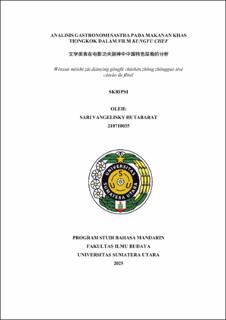Analisis Gastronomi Sastra pada Makanan Khas Tiongkok dalam Film Kungfu Chef
A Literary Gastronomic Analysis of Traditional Chinese Cuisine in the Film Kungfu Chef

Date
2025Author
Hutabarat, Sari Vangelisky
Advisor(s)
Adha, T Kasa Rullah
Metadata
Show full item recordAbstract
Literature continues to evolve in line with the development of the times, functioning not only as an educational medium but also as an aesthetic expression and cultural reflection. One modern form of literary work is film, which is considered a visual narrative text with structures, symbols, and meanings equivalent to written literary works. Film serves not only to entertain but also to represent cultural values, philosophies of life, and social identities. This study aims to analyze the representation of literary gastronomy in traditional Chinese cuisine as depicted in the film Kungfu Chef (功夫厨神, Gōng fū chú shén), a 2009 Hong Kong action-culinary film that combines Chinese martial arts and culinary traditions within a narrative that conveys cultural values, life philosophy, honor, and culinary heritage. This research employs a qualitative descriptive method with a content analysis approach, utilizing Literary Gastronomy theory and the Sociology of Literature perspective .The findings reveal that food in this film functions not merely as a consumable object but as a cultural symbol representing social status, honor, culinary skills, and the philosophy of Chinese life. Traditional dishes such as Kaishui Baicai (boiled cabbage), Babao Ya (Eight Treasure Duck), and Fo Tiao Qiang (Buddha Jumps Over the Wall) convey values of luxury, harmony, craftsmanship, and social status. Kungfu Chef demonstrates that food serves as a marker of cultural identity, social cohesion, and a medium for expressing life philosophy, enriching literary gastronomy studies within the context of Chinese culture.
Collections
- Undergraduate Theses [323]
